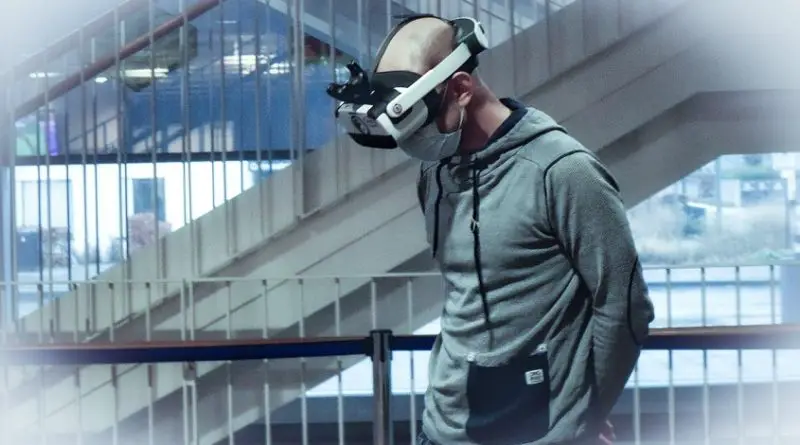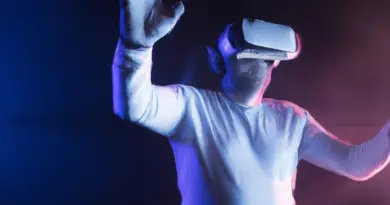Paradoxes of the Metaverse: A Deep Dive into the Intersection of Reality and Virtuality
The intersection of reality and virtuality in the Metaverse presents a series of paradoxes, including the paradox of presence, identity, agency, time, reality, and freedom. Understanding these paradoxes is crucial for developing advanced technologies that can create an immersive and engaging virtual experience.
The Paradox Metaverse is a virtual environment that offers a range of paradoxical experiences for users. It blurs the line between reality and virtuality, creating new forms of identity, agency, and presence. Understanding the paradoxes of the Metaverse is essential for anyone working in high-tech fields such as virtual reality movies.
One of the main paradoxes of the Metaverse is the paradox of presence. On the one hand, the Metaverse offers a sense of presence that can be incredibly immersive and engaging. On the other hand, maintaining a sense of presence in a virtual environment can be challenging, especially when dealing with issues like latency and network delays.
Other paradoxes include the paradox of identity, which involves defining and maintaining digital identities in a virtual environment, and the paradox of agency, which relates to the balance between user agency and system control. Additionally, the paradox of reality involves the challenge of defining and maintaining reality in a virtual environment.
By understanding these paradoxes and their implications, we can develop more effective strategies for building and navigating the Metaverse. Through case studies, research studies, and statistical analysis, we can gain insights into the complex and often paradoxical nature of this emerging field.
The Paradox of Presence
In the Metaverse, the paradox of presence arises from the fact that users can feel as if they are truly present in a virtual environment, despite the fact that they are physically located elsewhere. This sense of presence is created through the use of advanced virtual reality technologies, such as immersive headsets, haptic feedback, and spatial audio.
However, maintaining a sense of presence can be challenging. Factors such as latency, network congestion, and hardware limitations can all disrupt the immersive experience, causing users to feel disconnected from the virtual world. In addition, there is a risk of experiencing motion sickness, disorientation, or other negative side effects when using virtual reality technology for extended periods of time.
Despite these challenges, the potential benefits of creating a strong sense of presence in the Metaverse are significant. Virtual reality movies, for example, can provide a more immersive and engaging viewing experience for audiences, allowing them to feel as if they are truly part of the story. Additionally, virtual reality training programs can help users develop new skills and knowledge in a safe and controlled environment, improving learning outcomes and reducing risk.
The Paradox of Identity
In the paradox metaverse, identity takes on new forms and raises unique challenges. Here’s a concise exploration of the topic:
- The Metaverse enables new forms of identity that can transcend physical constraints, such as gender, race, and age. Through virtual reality movies and other immersive experiences, people can explore and express different aspects of their identity in a safe and creative environment.
- Defining and maintaining digital identity is a complex challenge. Digital identities are often fragmented across different platforms, and privacy and security are major concerns. The Metaverse raises the stakes by blurring the line between online and offline identities and creating new opportunities for identity theft and fraud.
Challenges of defining and maintaining a digital identity
- To address these challenges, we need to develop new frameworks for digital identity that balance privacy, security, and innovation. These frameworks should be based on advanced technologies such as blockchain, biometrics, and artificial intelligence. They should also be informed by research on human behavior, social norms, and cultural diversity.
- Virtual reality movies offer a glimpse of what the future of identity in the Metaverse could look like. By immersing us in rich and diverse worlds, these movies can help us expand our horizons and challenge our assumptions about identity. As we continue to explore the paradoxes of the Metaverse, we need to keep pushing the boundaries of what is possible and strive to create a more inclusive and empowering digital world.
The Paradox of Agency
The Paradox of Agency is a key challenge in the Metaverse. While virtual reality movies can offer new forms of agency, ensuring user agency in a virtual environment is not straightforward. Here are some considerations to keep in mind:
- User control: The Metaverse must provide users with a high degree of control over their virtual experience. This includes the ability to customize avatars, choose environments, and make decisions that affect the virtual world.
- Privacy: Users must have control over their personal data and privacy. The Metaverse must provide tools for users to manage their privacy settings and ensure that their personal information is not shared without their consent.
- Security: The Metaverse must provide a secure environment that protects users from cyber threats, such as hacking or identity theft. This requires robust security protocols and strong encryption.
- Ethical considerations: The Metaverse raises a range of ethical considerations, such as the potential for addiction, exploitation, and manipulation. Developers must consider these issues carefully and design the Metaverse with ethical principles in mind.
The Paradox of Time
The Paradox of Time in the Metaverse is a fascinating and complex topic that requires a deep understanding of virtual reality technology and its impact on our perception of time.
Here are some key insights:
- Virtual reality movies can alter our perception of time in the Metaverse by creating an immersive and dynamic environment that can distort our sense of time. For example, a movie that shows a long journey in a few minutes can make us feel as if time has passed quickly.
- Managing time in a virtual environment is a challenge that requires careful design and consideration. Virtual reality movies should be carefully crafted to ensure that the pacing and duration of the movie aligns with the user’s sense of time. This can be achieved through the use of visual cues, sound effects, and other techniques.
- Research studies have shown that virtual reality movies can have a powerful effect on our perception of time. For example, a study conducted by the University of Barcelona found that users who watched a virtual reality movie felt as if time had passed more quickly than those who watched a traditional movie.
- The Paradox of Time in the Metaverse highlights the need for careful consideration of the psychological and neurological effects of virtual reality technology. As we continue to develop and explore the possibilities of the Metaverse, it will be essential to balance the potential benefits with the risks and challenges associated with altering our perception of time.
The Paradox of Reality
The Paradox of Reality in the Metaverse is a fascinating topic that highlights the blurring of lines between the virtual and the real.
Here are some key points to consider:
- The Metaverse offers an immersive experience that can simulate the real world with a high degree of accuracy. This can make it difficult to distinguish between what is real and what is virtual.
- Defining and maintaining reality in a virtual environment can be challenging, as the parameters for what is real can be quite different from those in the physical world.
- Virtual Reality movies, in particular, provide a unique challenge, as they are designed to be so realistic that viewers can easily forget they are not in the physical world.
- One of the key challenges in maintaining the distinction between the real and the virtual is the potential for “presence bleed,” where the virtual world begins to impact the user’s perception of the physical world.
- However, there are also many opportunities for exploring the concept of reality in the Metaverse, such as creating new forms of reality or experimenting with altered perceptions of time and space.
The Paradox of Freedom
In the paradoxical world of the Metaverse, new forms of freedom can be experienced, but the challenges of balancing this freedom with responsibility in a virtual environment are numerous.
The following are some key insights into the paradox of freedom in the Metaverse:
- The Metaverse provides new opportunities for freedom of expression, creativity, and exploration. Virtual reality movies, for example, allow filmmakers to create immersive experiences that break free from the constraints of physical reality.
- At the same time, the Metaverse can present challenges when it comes to ensuring responsible behavior. Without proper oversight and governance, users may engage in harmful or inappropriate actions that can have real-world consequences.
- Balancing freedom and responsibility in the Metaverse requires a multi-faceted approach that includes strong community standards, effective moderation and enforcement mechanisms, and clear communication around acceptable behavior.
- Research studies show that users who feel empowered and respected in virtual environments are more likely to act responsibly and contribute positively to the community. Thus, a focus on promoting positive social norms and behaviors is critical in building a healthy and sustainable Metaverse ecosystem.




